NRSG264 Assignment: Clinical Reasoning Cycle Reflection Report
VerifiedAdded on 2022/12/30
|6
|1656
|60
Report
AI Summary
This report presents a student's reflection on the clinical reasoning cycle, focusing on a case study of a 38-year-old woman experiencing low mood, as presented in a video. The reflection meticulously follows the 8 steps of the clinical reasoning cycle: collecting information, processing information, identifying problems (depression), establishing goals (improving emotional and physical well-being), taking actions (therapeutic relationship, physical activity, medication), evaluating outcomes, and reflecting on the process and new learning. The patient's symptoms, including tearfulness, insomnia, lethargy, loss of appetite, and lack of interest, are analyzed in relation to depression. The report emphasizes the importance of evidence-based nursing interventions, patient-centered care, and social engagement to help the patient overcome her condition. References to relevant literature support the analysis and the proposed interventions. The student concludes that this practice enhances their knowledge and confidence in clinical settings.
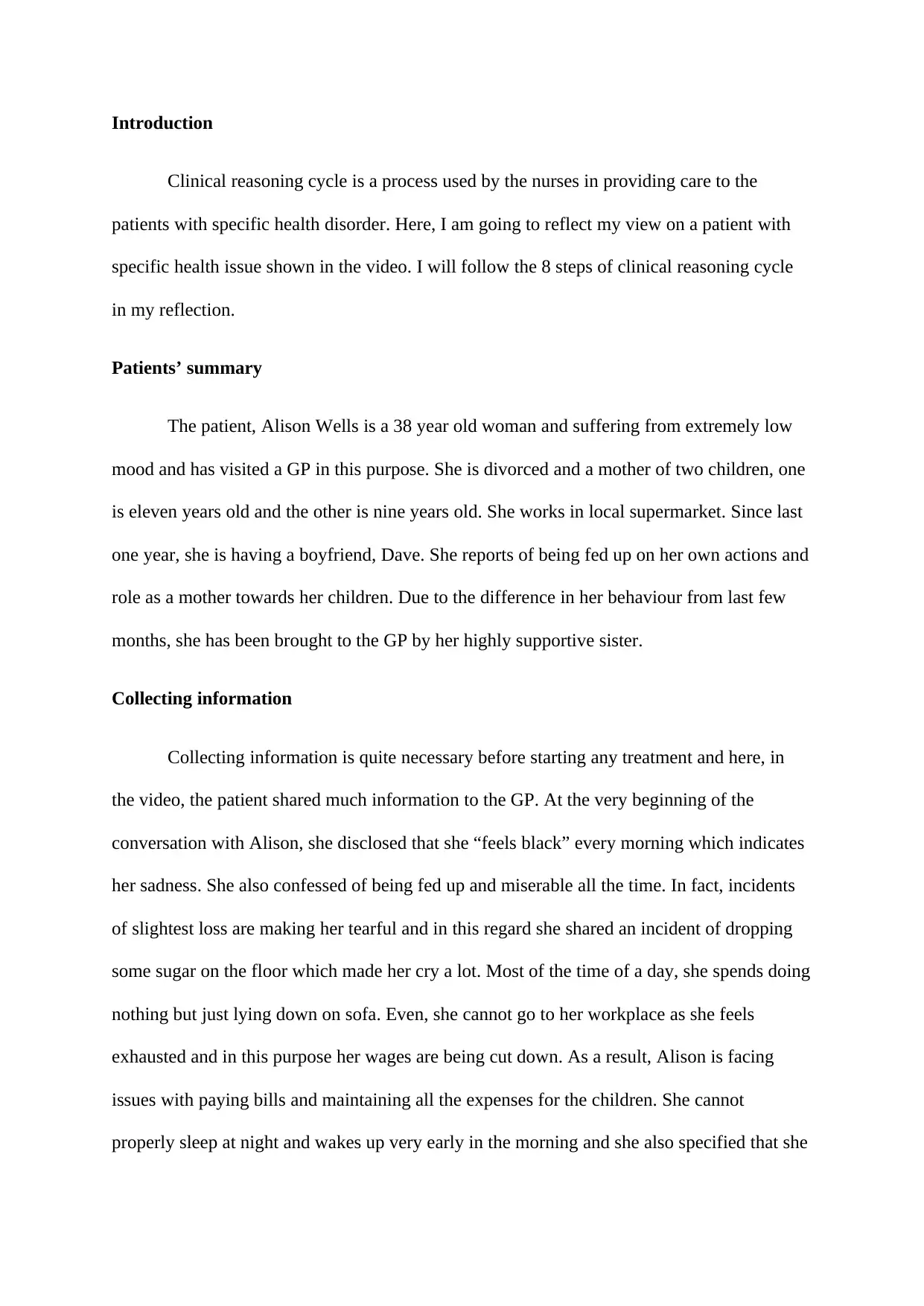
Introduction
Clinical reasoning cycle is a process used by the nurses in providing care to the
patients with specific health disorder. Here, I am going to reflect my view on a patient with
specific health issue shown in the video. I will follow the 8 steps of clinical reasoning cycle
in my reflection.
Patients’ summary
The patient, Alison Wells is a 38 year old woman and suffering from extremely low
mood and has visited a GP in this purpose. She is divorced and a mother of two children, one
is eleven years old and the other is nine years old. She works in local supermarket. Since last
one year, she is having a boyfriend, Dave. She reports of being fed up on her own actions and
role as a mother towards her children. Due to the difference in her behaviour from last few
months, she has been brought to the GP by her highly supportive sister.
Collecting information
Collecting information is quite necessary before starting any treatment and here, in
the video, the patient shared much information to the GP. At the very beginning of the
conversation with Alison, she disclosed that she “feels black” every morning which indicates
her sadness. She also confessed of being fed up and miserable all the time. In fact, incidents
of slightest loss are making her tearful and in this regard she shared an incident of dropping
some sugar on the floor which made her cry a lot. Most of the time of a day, she spends doing
nothing but just lying down on sofa. Even, she cannot go to her workplace as she feels
exhausted and in this purpose her wages are being cut down. As a result, Alison is facing
issues with paying bills and maintaining all the expenses for the children. She cannot
properly sleep at night and wakes up very early in the morning and she also specified that she
Clinical reasoning cycle is a process used by the nurses in providing care to the
patients with specific health disorder. Here, I am going to reflect my view on a patient with
specific health issue shown in the video. I will follow the 8 steps of clinical reasoning cycle
in my reflection.
Patients’ summary
The patient, Alison Wells is a 38 year old woman and suffering from extremely low
mood and has visited a GP in this purpose. She is divorced and a mother of two children, one
is eleven years old and the other is nine years old. She works in local supermarket. Since last
one year, she is having a boyfriend, Dave. She reports of being fed up on her own actions and
role as a mother towards her children. Due to the difference in her behaviour from last few
months, she has been brought to the GP by her highly supportive sister.
Collecting information
Collecting information is quite necessary before starting any treatment and here, in
the video, the patient shared much information to the GP. At the very beginning of the
conversation with Alison, she disclosed that she “feels black” every morning which indicates
her sadness. She also confessed of being fed up and miserable all the time. In fact, incidents
of slightest loss are making her tearful and in this regard she shared an incident of dropping
some sugar on the floor which made her cry a lot. Most of the time of a day, she spends doing
nothing but just lying down on sofa. Even, she cannot go to her workplace as she feels
exhausted and in this purpose her wages are being cut down. As a result, Alison is facing
issues with paying bills and maintaining all the expenses for the children. She cannot
properly sleep at night and wakes up very early in the morning and she also specified that she
Paraphrase This Document
Need a fresh take? Get an instant paraphrase of this document with our AI Paraphraser
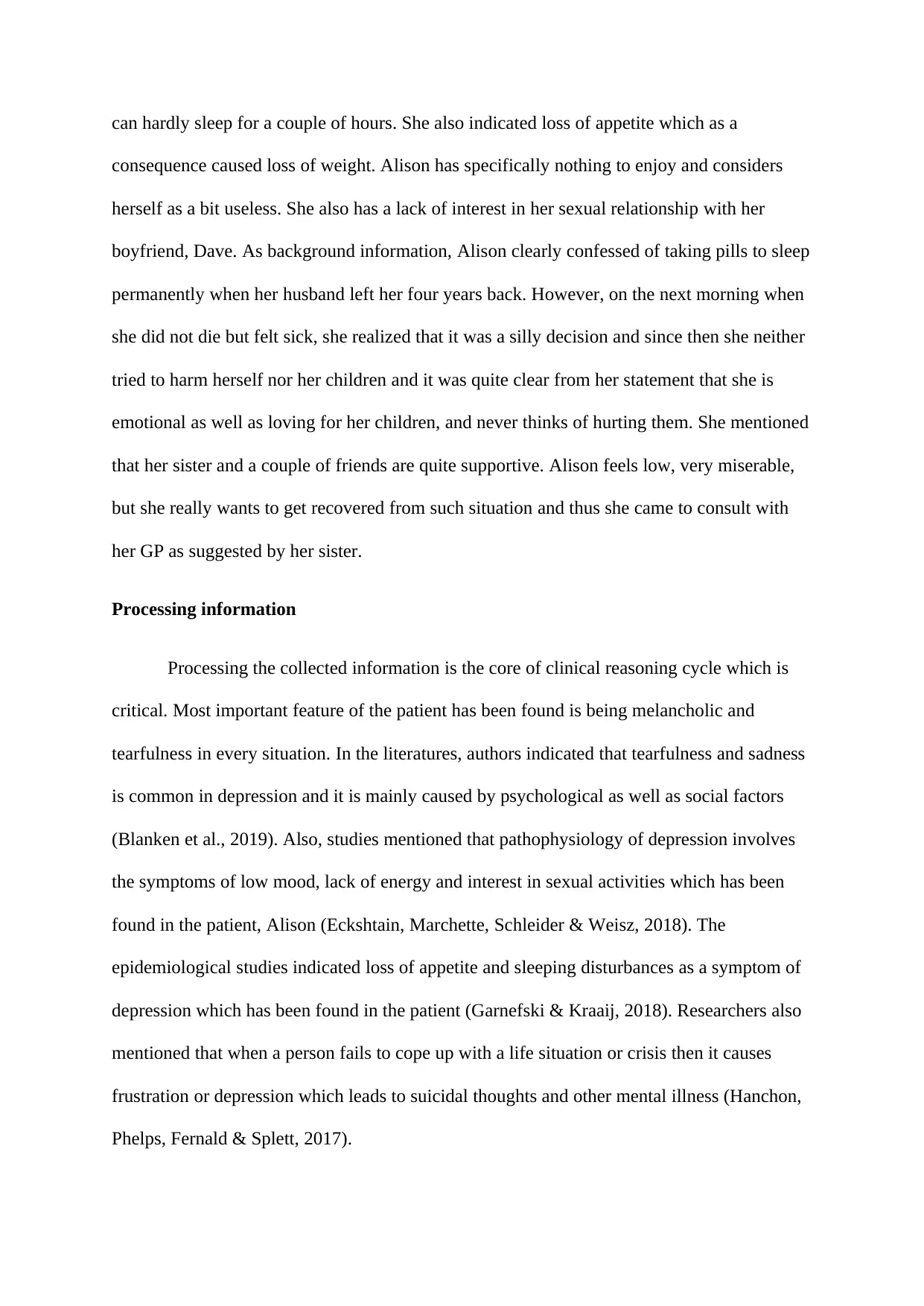
can hardly sleep for a couple of hours. She also indicated loss of appetite which as a
consequence caused loss of weight. Alison has specifically nothing to enjoy and considers
herself as a bit useless. She also has a lack of interest in her sexual relationship with her
boyfriend, Dave. As background information, Alison clearly confessed of taking pills to sleep
permanently when her husband left her four years back. However, on the next morning when
she did not die but felt sick, she realized that it was a silly decision and since then she neither
tried to harm herself nor her children and it was quite clear from her statement that she is
emotional as well as loving for her children, and never thinks of hurting them. She mentioned
that her sister and a couple of friends are quite supportive. Alison feels low, very miserable,
but she really wants to get recovered from such situation and thus she came to consult with
her GP as suggested by her sister.
Processing information
Processing the collected information is the core of clinical reasoning cycle which is
critical. Most important feature of the patient has been found is being melancholic and
tearfulness in every situation. In the literatures, authors indicated that tearfulness and sadness
is common in depression and it is mainly caused by psychological as well as social factors
(Blanken et al., 2019). Also, studies mentioned that pathophysiology of depression involves
the symptoms of low mood, lack of energy and interest in sexual activities which has been
found in the patient, Alison (Eckshtain, Marchette, Schleider & Weisz, 2018). The
epidemiological studies indicated loss of appetite and sleeping disturbances as a symptom of
depression which has been found in the patient (Garnefski & Kraaij, 2018). Researchers also
mentioned that when a person fails to cope up with a life situation or crisis then it causes
frustration or depression which leads to suicidal thoughts and other mental illness (Hanchon,
Phelps, Fernald & Splett, 2017).
consequence caused loss of weight. Alison has specifically nothing to enjoy and considers
herself as a bit useless. She also has a lack of interest in her sexual relationship with her
boyfriend, Dave. As background information, Alison clearly confessed of taking pills to sleep
permanently when her husband left her four years back. However, on the next morning when
she did not die but felt sick, she realized that it was a silly decision and since then she neither
tried to harm herself nor her children and it was quite clear from her statement that she is
emotional as well as loving for her children, and never thinks of hurting them. She mentioned
that her sister and a couple of friends are quite supportive. Alison feels low, very miserable,
but she really wants to get recovered from such situation and thus she came to consult with
her GP as suggested by her sister.
Processing information
Processing the collected information is the core of clinical reasoning cycle which is
critical. Most important feature of the patient has been found is being melancholic and
tearfulness in every situation. In the literatures, authors indicated that tearfulness and sadness
is common in depression and it is mainly caused by psychological as well as social factors
(Blanken et al., 2019). Also, studies mentioned that pathophysiology of depression involves
the symptoms of low mood, lack of energy and interest in sexual activities which has been
found in the patient, Alison (Eckshtain, Marchette, Schleider & Weisz, 2018). The
epidemiological studies indicated loss of appetite and sleeping disturbances as a symptom of
depression which has been found in the patient (Garnefski & Kraaij, 2018). Researchers also
mentioned that when a person fails to cope up with a life situation or crisis then it causes
frustration or depression which leads to suicidal thoughts and other mental illness (Hanchon,
Phelps, Fernald & Splett, 2017).
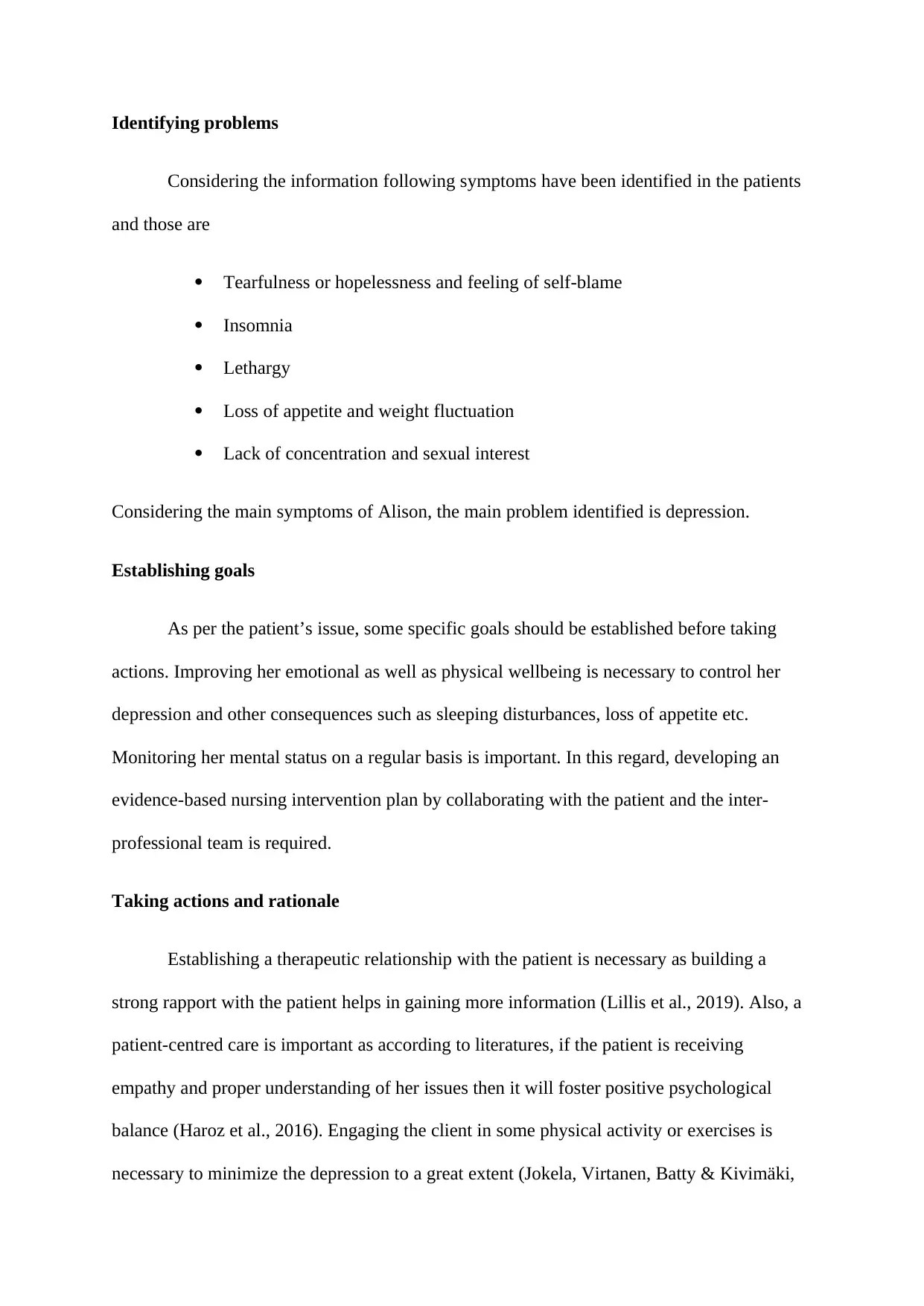
Identifying problems
Considering the information following symptoms have been identified in the patients
and those are
Tearfulness or hopelessness and feeling of self-blame
Insomnia
Lethargy
Loss of appetite and weight fluctuation
Lack of concentration and sexual interest
Considering the main symptoms of Alison, the main problem identified is depression.
Establishing goals
As per the patient’s issue, some specific goals should be established before taking
actions. Improving her emotional as well as physical wellbeing is necessary to control her
depression and other consequences such as sleeping disturbances, loss of appetite etc.
Monitoring her mental status on a regular basis is important. In this regard, developing an
evidence-based nursing intervention plan by collaborating with the patient and the inter-
professional team is required.
Taking actions and rationale
Establishing a therapeutic relationship with the patient is necessary as building a
strong rapport with the patient helps in gaining more information (Lillis et al., 2019). Also, a
patient-centred care is important as according to literatures, if the patient is receiving
empathy and proper understanding of her issues then it will foster positive psychological
balance (Haroz et al., 2016). Engaging the client in some physical activity or exercises is
necessary to minimize the depression to a great extent (Jokela, Virtanen, Batty & Kivimäki,
Considering the information following symptoms have been identified in the patients
and those are
Tearfulness or hopelessness and feeling of self-blame
Insomnia
Lethargy
Loss of appetite and weight fluctuation
Lack of concentration and sexual interest
Considering the main symptoms of Alison, the main problem identified is depression.
Establishing goals
As per the patient’s issue, some specific goals should be established before taking
actions. Improving her emotional as well as physical wellbeing is necessary to control her
depression and other consequences such as sleeping disturbances, loss of appetite etc.
Monitoring her mental status on a regular basis is important. In this regard, developing an
evidence-based nursing intervention plan by collaborating with the patient and the inter-
professional team is required.
Taking actions and rationale
Establishing a therapeutic relationship with the patient is necessary as building a
strong rapport with the patient helps in gaining more information (Lillis et al., 2019). Also, a
patient-centred care is important as according to literatures, if the patient is receiving
empathy and proper understanding of her issues then it will foster positive psychological
balance (Haroz et al., 2016). Engaging the client in some physical activity or exercises is
necessary to minimize the depression to a great extent (Jokela, Virtanen, Batty & Kivimäki,
⊘ This is a preview!⊘
Do you want full access?
Subscribe today to unlock all pages.

Trusted by 1+ million students worldwide
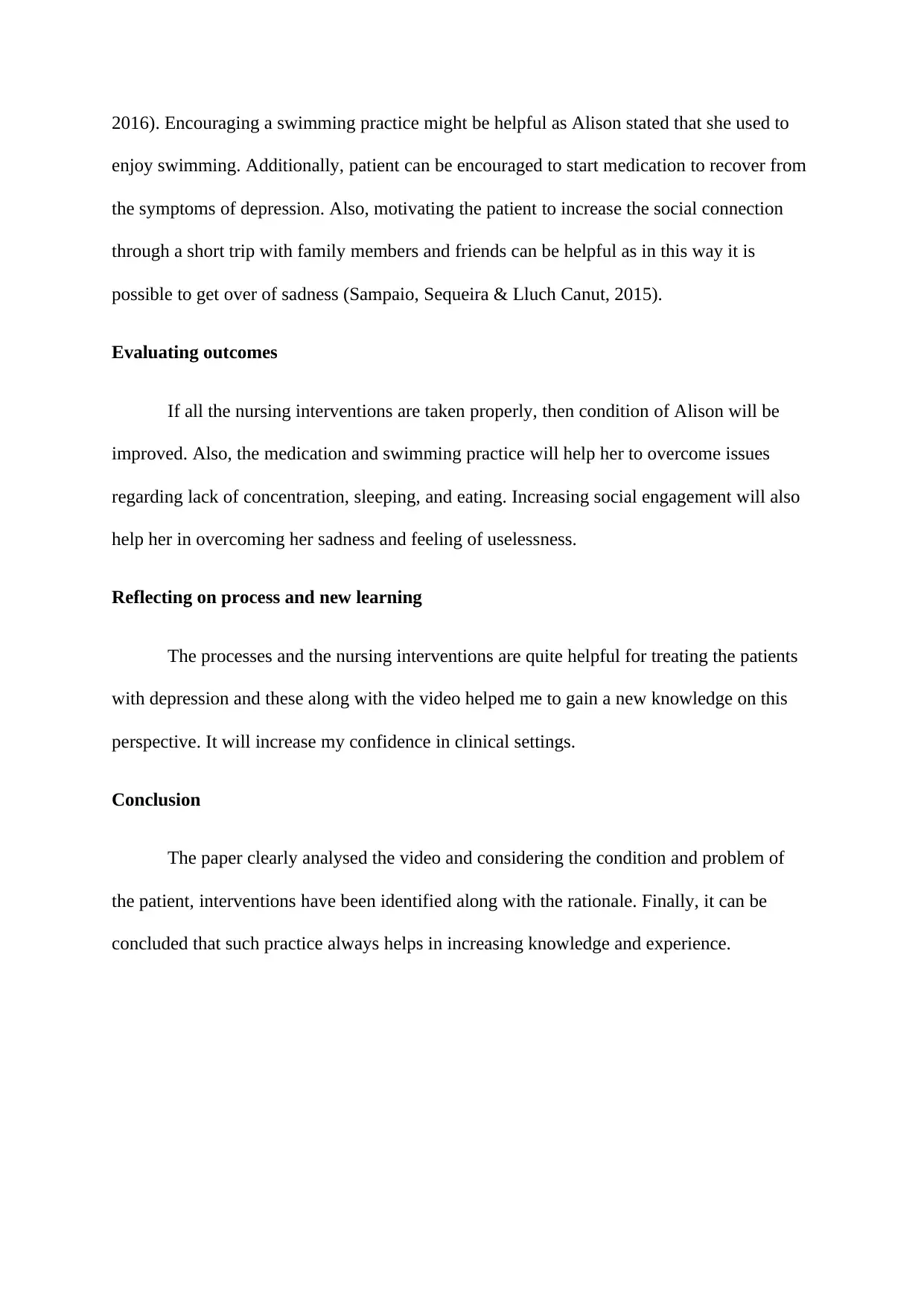
2016). Encouraging a swimming practice might be helpful as Alison stated that she used to
enjoy swimming. Additionally, patient can be encouraged to start medication to recover from
the symptoms of depression. Also, motivating the patient to increase the social connection
through a short trip with family members and friends can be helpful as in this way it is
possible to get over of sadness (Sampaio, Sequeira & Lluch Canut, 2015).
Evaluating outcomes
If all the nursing interventions are taken properly, then condition of Alison will be
improved. Also, the medication and swimming practice will help her to overcome issues
regarding lack of concentration, sleeping, and eating. Increasing social engagement will also
help her in overcoming her sadness and feeling of uselessness.
Reflecting on process and new learning
The processes and the nursing interventions are quite helpful for treating the patients
with depression and these along with the video helped me to gain a new knowledge on this
perspective. It will increase my confidence in clinical settings.
Conclusion
The paper clearly analysed the video and considering the condition and problem of
the patient, interventions have been identified along with the rationale. Finally, it can be
concluded that such practice always helps in increasing knowledge and experience.
enjoy swimming. Additionally, patient can be encouraged to start medication to recover from
the symptoms of depression. Also, motivating the patient to increase the social connection
through a short trip with family members and friends can be helpful as in this way it is
possible to get over of sadness (Sampaio, Sequeira & Lluch Canut, 2015).
Evaluating outcomes
If all the nursing interventions are taken properly, then condition of Alison will be
improved. Also, the medication and swimming practice will help her to overcome issues
regarding lack of concentration, sleeping, and eating. Increasing social engagement will also
help her in overcoming her sadness and feeling of uselessness.
Reflecting on process and new learning
The processes and the nursing interventions are quite helpful for treating the patients
with depression and these along with the video helped me to gain a new knowledge on this
perspective. It will increase my confidence in clinical settings.
Conclusion
The paper clearly analysed the video and considering the condition and problem of
the patient, interventions have been identified along with the rationale. Finally, it can be
concluded that such practice always helps in increasing knowledge and experience.
Paraphrase This Document
Need a fresh take? Get an instant paraphrase of this document with our AI Paraphraser
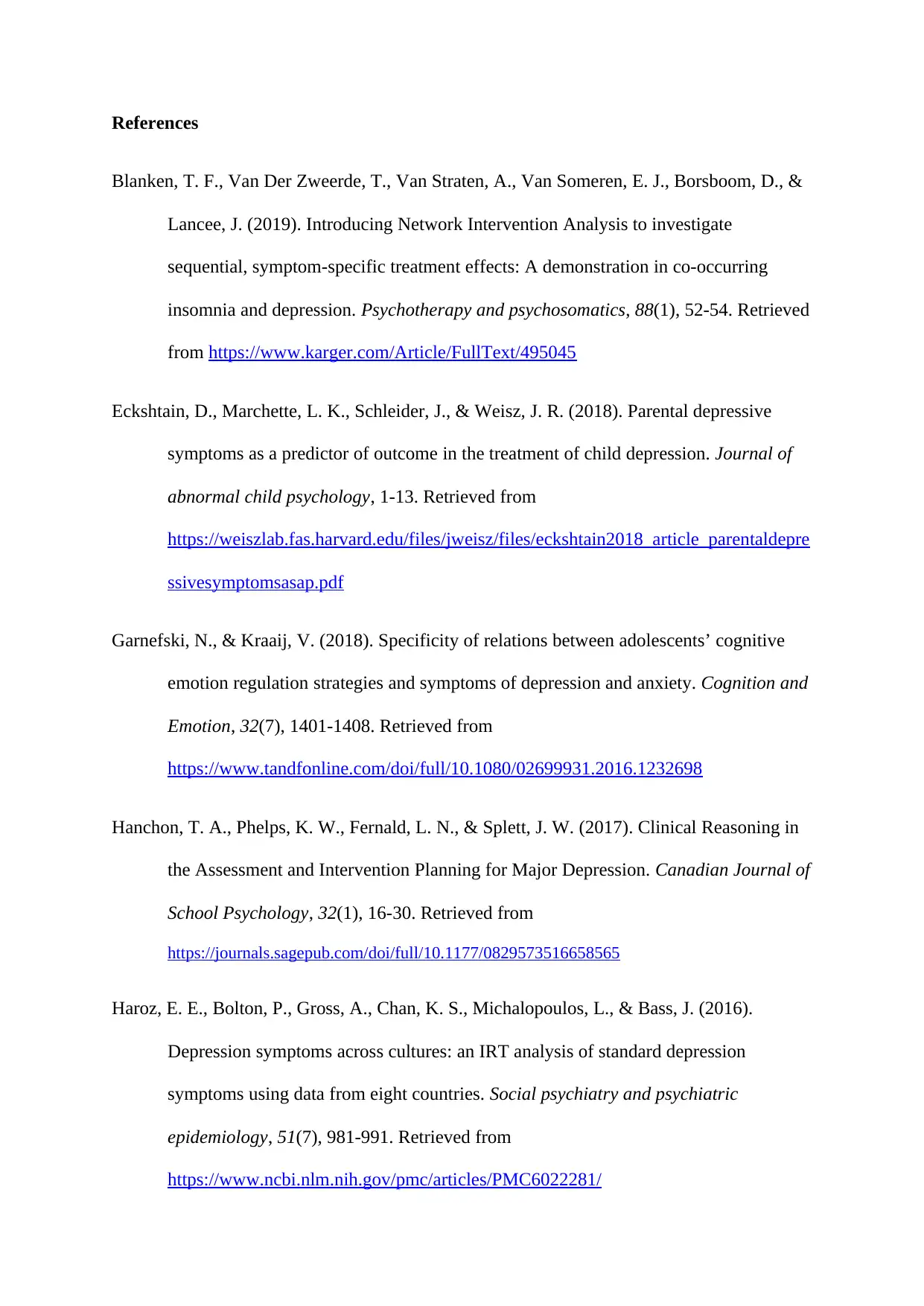
References
Blanken, T. F., Van Der Zweerde, T., Van Straten, A., Van Someren, E. J., Borsboom, D., &
Lancee, J. (2019). Introducing Network Intervention Analysis to investigate
sequential, symptom-specific treatment effects: A demonstration in co-occurring
insomnia and depression. Psychotherapy and psychosomatics, 88(1), 52-54. Retrieved
from https://www.karger.com/Article/FullText/495045
Eckshtain, D., Marchette, L. K., Schleider, J., & Weisz, J. R. (2018). Parental depressive
symptoms as a predictor of outcome in the treatment of child depression. Journal of
abnormal child psychology, 1-13. Retrieved from
https://weiszlab.fas.harvard.edu/files/jweisz/files/eckshtain2018_article_parentaldepre
ssivesymptomsasap.pdf
Garnefski, N., & Kraaij, V. (2018). Specificity of relations between adolescents’ cognitive
emotion regulation strategies and symptoms of depression and anxiety. Cognition and
Emotion, 32(7), 1401-1408. Retrieved from
https://www.tandfonline.com/doi/full/10.1080/02699931.2016.1232698
Hanchon, T. A., Phelps, K. W., Fernald, L. N., & Splett, J. W. (2017). Clinical Reasoning in
the Assessment and Intervention Planning for Major Depression. Canadian Journal of
School Psychology, 32(1), 16-30. Retrieved from
https://journals.sagepub.com/doi/full/10.1177/0829573516658565
Haroz, E. E., Bolton, P., Gross, A., Chan, K. S., Michalopoulos, L., & Bass, J. (2016).
Depression symptoms across cultures: an IRT analysis of standard depression
symptoms using data from eight countries. Social psychiatry and psychiatric
epidemiology, 51(7), 981-991. Retrieved from
https://www.ncbi.nlm.nih.gov/pmc/articles/PMC6022281/
Blanken, T. F., Van Der Zweerde, T., Van Straten, A., Van Someren, E. J., Borsboom, D., &
Lancee, J. (2019). Introducing Network Intervention Analysis to investigate
sequential, symptom-specific treatment effects: A demonstration in co-occurring
insomnia and depression. Psychotherapy and psychosomatics, 88(1), 52-54. Retrieved
from https://www.karger.com/Article/FullText/495045
Eckshtain, D., Marchette, L. K., Schleider, J., & Weisz, J. R. (2018). Parental depressive
symptoms as a predictor of outcome in the treatment of child depression. Journal of
abnormal child psychology, 1-13. Retrieved from
https://weiszlab.fas.harvard.edu/files/jweisz/files/eckshtain2018_article_parentaldepre
ssivesymptomsasap.pdf
Garnefski, N., & Kraaij, V. (2018). Specificity of relations between adolescents’ cognitive
emotion regulation strategies and symptoms of depression and anxiety. Cognition and
Emotion, 32(7), 1401-1408. Retrieved from
https://www.tandfonline.com/doi/full/10.1080/02699931.2016.1232698
Hanchon, T. A., Phelps, K. W., Fernald, L. N., & Splett, J. W. (2017). Clinical Reasoning in
the Assessment and Intervention Planning for Major Depression. Canadian Journal of
School Psychology, 32(1), 16-30. Retrieved from
https://journals.sagepub.com/doi/full/10.1177/0829573516658565
Haroz, E. E., Bolton, P., Gross, A., Chan, K. S., Michalopoulos, L., & Bass, J. (2016).
Depression symptoms across cultures: an IRT analysis of standard depression
symptoms using data from eight countries. Social psychiatry and psychiatric
epidemiology, 51(7), 981-991. Retrieved from
https://www.ncbi.nlm.nih.gov/pmc/articles/PMC6022281/
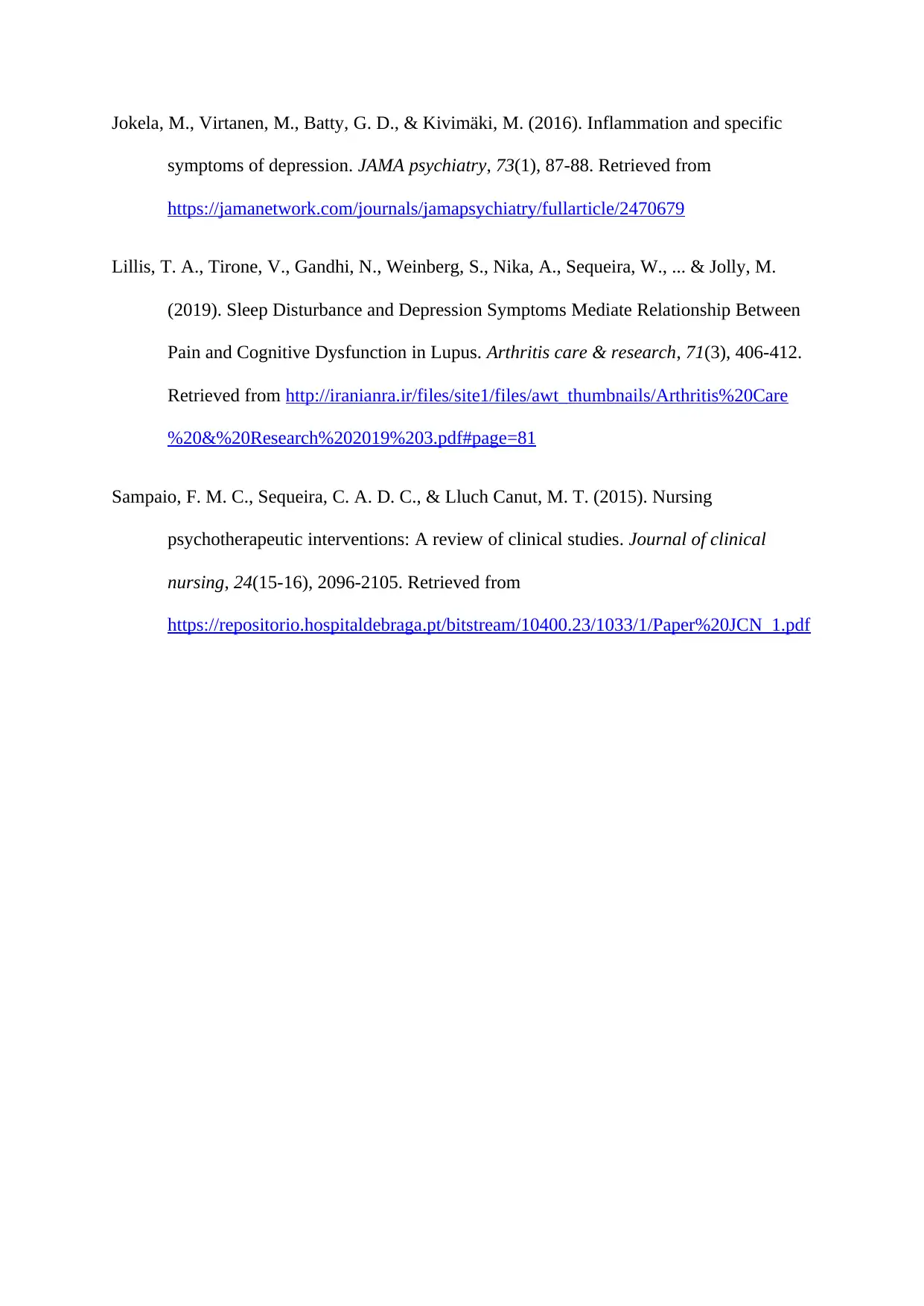
Jokela, M., Virtanen, M., Batty, G. D., & Kivimäki, M. (2016). Inflammation and specific
symptoms of depression. JAMA psychiatry, 73(1), 87-88. Retrieved from
https://jamanetwork.com/journals/jamapsychiatry/fullarticle/2470679
Lillis, T. A., Tirone, V., Gandhi, N., Weinberg, S., Nika, A., Sequeira, W., ... & Jolly, M.
(2019). Sleep Disturbance and Depression Symptoms Mediate Relationship Between
Pain and Cognitive Dysfunction in Lupus. Arthritis care & research, 71(3), 406-412.
Retrieved from http://iranianra.ir/files/site1/files/awt_thumbnails/Arthritis%20Care
%20&%20Research%202019%203.pdf#page=81
Sampaio, F. M. C., Sequeira, C. A. D. C., & Lluch Canut, M. T. (2015). Nursing
psychotherapeutic interventions: A review of clinical studies. Journal of clinical
nursing, 24(15-16), 2096-2105. Retrieved from
https://repositorio.hospitaldebraga.pt/bitstream/10400.23/1033/1/Paper%20JCN_1.pdf
symptoms of depression. JAMA psychiatry, 73(1), 87-88. Retrieved from
https://jamanetwork.com/journals/jamapsychiatry/fullarticle/2470679
Lillis, T. A., Tirone, V., Gandhi, N., Weinberg, S., Nika, A., Sequeira, W., ... & Jolly, M.
(2019). Sleep Disturbance and Depression Symptoms Mediate Relationship Between
Pain and Cognitive Dysfunction in Lupus. Arthritis care & research, 71(3), 406-412.
Retrieved from http://iranianra.ir/files/site1/files/awt_thumbnails/Arthritis%20Care
%20&%20Research%202019%203.pdf#page=81
Sampaio, F. M. C., Sequeira, C. A. D. C., & Lluch Canut, M. T. (2015). Nursing
psychotherapeutic interventions: A review of clinical studies. Journal of clinical
nursing, 24(15-16), 2096-2105. Retrieved from
https://repositorio.hospitaldebraga.pt/bitstream/10400.23/1033/1/Paper%20JCN_1.pdf
⊘ This is a preview!⊘
Do you want full access?
Subscribe today to unlock all pages.

Trusted by 1+ million students worldwide
1 out of 6
Related Documents
Your All-in-One AI-Powered Toolkit for Academic Success.
+13062052269
info@desklib.com
Available 24*7 on WhatsApp / Email
![[object Object]](/_next/static/media/star-bottom.7253800d.svg)
Unlock your academic potential
Copyright © 2020–2026 A2Z Services. All Rights Reserved. Developed and managed by ZUCOL.




